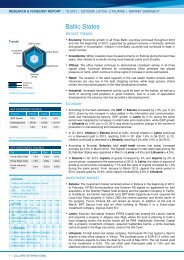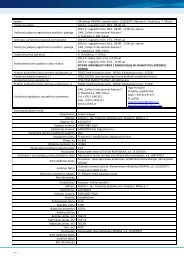baltic states and belarus real estate market review - Colliers
baltic states and belarus real estate market review - Colliers
baltic states and belarus real estate market review - Colliers
You also want an ePaper? Increase the reach of your titles
YUMPU automatically turns print PDFs into web optimized ePapers that Google loves.
Real Estate Market Review 2011 | Belarus Legal Overview<br />
only repayment of a credit extended by Belarusian banks or a<br />
loan provided by the International Finance Corporation (IFC) or<br />
European Bank for Reconstruction <strong>and</strong> Development (EBRD).<br />
Belarusian banks may act as mortgagees only if they hold a<br />
licence from the National Bank to place attracted funds in their<br />
own name <strong>and</strong> for their own account on the condition of<br />
recurrence, interest payment <strong>and</strong> maturity. The President of the<br />
Republic of Belarus is entitled to determine other organisations<br />
which may be mortgagees of l<strong>and</strong> plots <strong>and</strong> rights to lease l<strong>and</strong><br />
plots.<br />
Mortgages must be registered with the Real Estate Register.<br />
Property Management<br />
Maintenance of <strong>real</strong> <strong>estate</strong> is usually carried out by the owner.<br />
In the case of joint ownership, owners may establish an owners’<br />
association.<br />
Lease Agreements<br />
General<br />
General terms for lease agreements are laid down in the<br />
Belarusian Civil Code <strong>and</strong> the Lease Law. Terms of lease are<br />
subject to agreement between the parties. Lease agreements<br />
should specify the description of leased objects (inventory<br />
number, location, area) <strong>and</strong> the rent.<br />
Duration <strong>and</strong> Expiry of Lease Agreement<br />
The duration <strong>and</strong> expiry of a lease agreement are usually fixed<br />
in the agreement. Belarusian law lays down some general rules<br />
under which lease agreements may be for a definite or indefinite<br />
term. The Civil Code sets grounds for termination of a lease<br />
agreement by the court at the request of a party. The parties<br />
may agree additional grounds for termination by the court or<br />
unilaterally.<br />
Lease Payment <strong>and</strong> Other Expenses (Utilities)<br />
The amount <strong>and</strong> the currency of lease payment (rent) are<br />
subject to agreement between the parties. However, several<br />
restrictions apply to state-owned property <strong>and</strong> retail premises,<br />
including shopping centres. Rent for trade premises should be<br />
calculated in basic units (special units pegged to the Belarusian<br />
currency <strong>and</strong> established by the Government). Rent for trade<br />
premises is calculated by multiplying the basic rent (from<br />
EUR 2.5 to EUR 9.5 depending on location) <strong>and</strong> coefficient (from<br />
0.6 to 1 determined by the local authority depending on location).<br />
Application of other coefficients to increase rent should be<br />
substantiated <strong>and</strong> agreed with the local authority.<br />
Maintenance <strong>and</strong> utilities (such as water, gas <strong>and</strong> electricity)<br />
are usually paid by the tenant in addition to rent. As to retail<br />
premises, only a limited number of expenses incurred by the<br />
l<strong>and</strong>lord may be passed on to the tenant. The cost of additional<br />
services by the l<strong>and</strong>lord to the tenant should be agreed with the<br />
local authority.<br />
Distressed Assets Purchase<br />
Acquisition of distressed assets may be a feature if a company<br />
that owns <strong>real</strong> property faces financial difficulty <strong>and</strong> needs<br />
emergency funds to cover debts. Distressed assets purchase is<br />
not specifically regulated in Belarus. However, the following<br />
issues should be taken into consideration.<br />
Time for closing a transaction with distressed assets is usually<br />
shorter as the selling company is under pressure to receive<br />
funds to settle with its creditors. Consequently, due diligence<br />
time frames may be shorter. At the same time, due diligence is<br />
especially required as risks related to distressed assets are<br />
higher (e.g. the property may be mortgaged or seized by a<br />
creditor).<br />
The risk is that insolvency proceedings may commence against<br />
the seller after disposal of distressed assets to a buyer. Under<br />
the Belarusian Law on Insolvency, transactions by the seller<br />
preceding insolvency may be held invalid. For example, a<br />
transaction may be held invalid if it took place within six months,<br />
one year, or three years before commencement of insolvency<br />
proceedings, depending upon the circumstances <strong>and</strong> grounds<br />
involved.<br />
Sometimes distressed assets are sold at a low - even<br />
nominal - price. This option should be thoroughly assessed, as<br />
the transaction may be held to be fictitious (eg intended to cover<br />
up a gratuitous transfer). This may mean that the transaction is<br />
held invalid <strong>and</strong> may also entail tax consequences (charge of<br />
profit tax plus penalties).<br />
KIRYL APANASEVICH<br />
Partner, Head of the Real Estate & Construction Team in Belarus<br />
SORAINEN Belarus<br />
ul Nemiga 40, 220004 Minsk, Belarus<br />
Phone +375 17 306 2102<br />
Kiryl.Apanasevich@sorainen.com<br />
BALTIC LAW FIRM OF THE YEAR<br />
Awarded by:<br />
Financial Times & Merger<strong>market</strong><br />
International Financial Law Review<br />
PLC Which lawyer?<br />
International Tax Review<br />
p. 99













